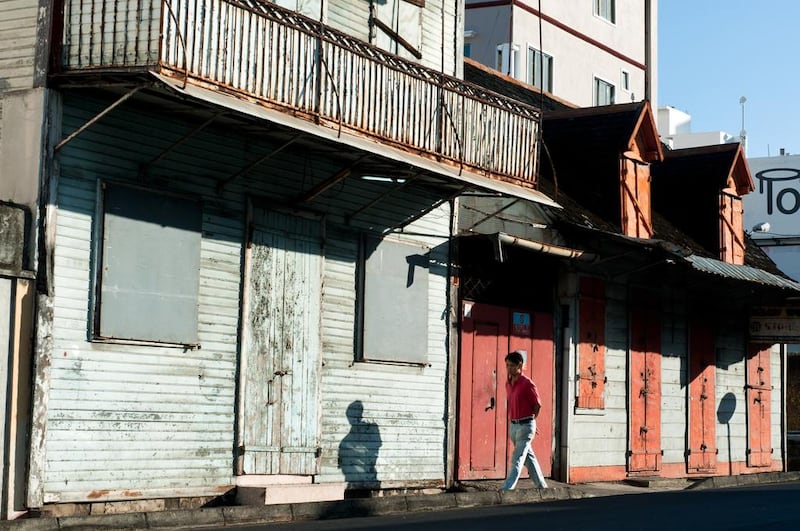Eve Out of Her Ruins is a spare, traumatic and enriching novel, newly and superbly translated by Jeffrey Zuckerman, which takes place in the city of Port Louis on the island-nation of Mauritius. It is an environment, based on a penurious district of the city known as Troumaron, that is steadily oppressive, potent with agitation, pulsingly sinister, pervasively menacing.
Most of this atmosphere is generated by the city’s men (when is it not?). As Eve, the most prominent of the book’s four main characters, puts it at the start of the novel: “There’s a guard at the end of each street... The boys swear oaths, declare rules, make alliances: a pack mentality. If you care about your life, your body, if you’re a girl, if you’re old, you’d do best to give them a wide berth. They spread a pool of oil around them, in which their bored faces and their footsteps are reflected. Now, nobody walks. Everybody runs. It’s a dance to the death. According to them, most females carry the same heaviness: this hole that is an impassable yet open door that keeps its secrets. So they go and hunt, like the hundreds of feral dogs raging through the city and tearing it apart.”
Into this unlovely terrain, Ananda Devi inserts a handful of teenagers – Eve, Saadiq, Clélio, Savita – who are struggling to survive, and in some cases, flourish, in circumstances that are both brutal and brutalising. We encounter their struggles by way of a series of rotating, short first-person chapters, each spoken from the perspective of a different character.
The vigour and particularity she brings to each voice is such that, even though we are exposed to them in relatively short bursts, her characters emerge from the page with arresting immediacy and startling vividness. She has taken care to attend to the form of their monologues at the level of phrase, sentence, paragraph, and she has injected each voice with tics and cadences that, while usually identifiably discrete, resonate with the other patterns of speech that are accommodated in the novel. This lends the work as a whole a discomfiting sense of latent, disrupted coherence, and allows Devi to keep a character present in the reader’s mind even when that character is not present on the page.
This is welcome, for the personalities that populate her book are usually strenuously imagined, fully-faceted, bracingly idiosyncratic (it would be a pity to lose one to the demands of literary form). Eve is a young woman with an impoverished and abusive background who views herself as a confounder of categories, at once the predator and the victim of the men to whom she surrenders – and with whom she trades – her body.
These qualities are present in her voice, which is at once resigned, hardened, mutedly defiant, fragile, vulnerable, and characterised by occasional moments of lyricism, as when she refers to “This troubled water, this murky world, this far-away smile like a moonlit night, when the wind comes to whisper things that make us pensive and sad.”
Saadiq, who also regards himself as possessing a kind of dual identity, is an ostensibly gentler sort who, after encountering the work of the poet Rimbaud at school, becomes obsessed with reading and writing, develops an unnerving obsession with Eve, and resolves to master them both – he wants, he tells us, to “tame words” and to “have Eve”.
Present to frustrate Saadiq is the figure of Savita, who is “riveted” by Eve’s sadness, becomes her girlfriend, offers her companionship, love and solace, and awakens her to what she calls “the poetry of women” – a sense of female solidarity, established under the pervasive gaze of men, that Saadiq is unable to offer and cannot comprehend.
Cropping up in the midst of these three stories is the hectic and violent Clélio, who has already been imprisoned for assault and battery, harbours a desire to kill, longs for the return of his brother from France, and hopes to find someone who will free him from the black hole that is Troumaron.
Devi weaves these narratives together to form a novel that offers a rich and subtle depiction of a handful of young lives that are being lived under, and in some instances contributing to, terrible social, cultural and economic duress. In doing so, she confronts us with instances of great pain and suffering, yet seldom without embracing the redemptive qualities of attentiveness, spirit, beauty.
This is a novel that can take you to fathomless depths. Its artistry is such that you are unlikely to close it feeling ruined.
Matthew Adams also writes for the TLS, The Spectator and the Literary Review.





